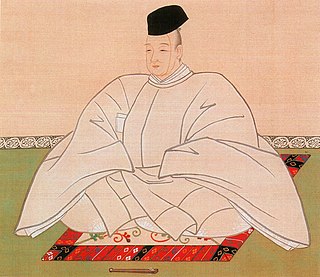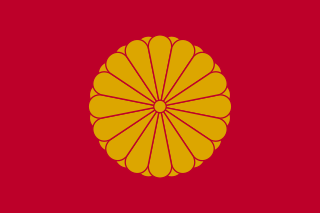
Emperor Kōkaku was the 119th emperor of Japan, according to the traditional order of succession. Kōkaku's reigned from December 16, 1780, until his abdication on May 7, 1817 in favor of his son. After his abdication he ruled as a Daijō Tennō also known as a Jōkō (上皇) until his death in 1840. He has the distinction of being most recent Japanese emperor to have abdicated.
The Japanese era name, also known as gengō (元号), is the first of the two elements that identify years in the Japanese era calendar scheme. The second element, a number, indicates the year number within the era. The third part is the literal "nen (年)" meaning "year."

The Emperor's Birthday is a national holiday in the Japanese calendar celebrated on the birthday of the reigning Emperor, which is currently 23 December, as Emperor Akihito was born on that day in 1933. Akihito is due to retire on 30 April 2019, meaning that the holiday will not be observed in 2019, and its next celebration will be on the birthday of Crown Prince Naruhito.

Bunpō (文保) was a Japanese era name after Shōwa and before Gen'ō. This period spanned the years from February 1317 to April 1319. The reigning Emperors were Emperor Hanazono-tennō (花園天皇) and Go-Daigo-tennō (後醍醐天皇).
Public holidays in Japan were established by the Public Holiday Law of 1948. A provision of the law establishes that when a national holiday falls on a Sunday, the next working day shall become a public holiday, known as furikae kyūjitsu. Additionally, any day that falls between two other national holidays shall also become a holiday, known as kokumin no kyūjitsu. May 4, sandwiched between Constitution Memorial Day on May 3 and Children's Day on May 5, was an annual example of such a holiday until it was replaced by Greenery Day in 2007.
Daijō Tennō or Dajō Tennō (太上天皇) is the title for a Japanese Emperor who abdicated in favor of a successor. The term is often shortened to Jōkō (上皇).
In Japan, the aide-de-camp to the Emperor is a special military official whose primary duties are to report military affairs to the Emperor and act as a close attendant (chamberlain). From 1896 through to 1945, a small number of army and naval aides-de-camp were supplied to the Emperor due to his increased status and the risks to him during wartime.

Jōkyō (貞享) was a Japanese era name after Tenna and before Genroku. This period spanned the years from February 1684 through September 1688. The reigning emperors were Reigen-tennō (霊元天皇) and Higashiyama-tennō (東山天皇).

Ten'an (天安) was a Japanese era name after Saikō and before Jōgan. This period spanned the years from February 857 through April 859. The reigning emperors were Montoku-tennō (文徳天皇) and Seiwa-tennō (清和天皇).

The Enthronement of the Emperor of Japan is an ancient ceremony that marks the accession of a new ruler to the Chrysanthemum Throne, in the world's oldest continuous hereditary monarchy. Various ancient imperial regalia are given to the new sovereign during the course of the rite.
On January 7, 1989, Hirohito, the 124th Emperor of Japan according to the traditional order of succession, died in his sleep at 6:33 AM after suffering from intestinal cancer for some time. He was 87. His state funeral was held on 24 February, when the late emperor was buried near his parents at the Musashi Imperial Graveyard in Hachiōji, Tokyo.

Akiyama Tokuzō was a Japanese chef who served as Emperor Taishō's and later Emperor Shōwa's imperial chef. He is regarded as an influential figure in spreading French cuisine in Japan. His life was adapted into a novel and several television series. He is regarded as the "Japanese Escoffier".
Events in the year 2019 in Japan.

The Reiwa period will be the next era of Japan. The period is expected to start on 1 May 2019, the day when Emperor Akihito's elder son, Naruhito, is expected to ascend to the throne as the 126th Emperor of Japan. Emperor Akihito is expected to abdicate the Chrysanthemum Throne on 30 April 2019, marking the end of Heisei period. The year 2019 corresponds to Heisei 31 until 30 April, and Reiwa 1 from 1 May 2019.













